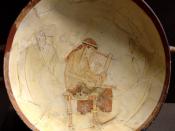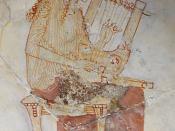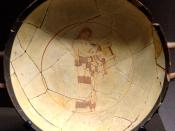narrated excursion through the furrows of the two poets lines
To work the land as a form of living and to gain sustenance as a result of this work, this is the issue addressed by both Hesiod in Works and Days and Virgil in The Georgics. However, while each poet advocates the same lifestyle, each poet's true meaning lies in what they hope to achieve through an agricultural existence. For Hesiod, a bucolic existence is a means of attaining plentiful stores, making life easier both socially and physically, as well as developing a closeness with the gods. On the other hand, Virgil felt that the life of a farmer was not just about attaining ample stores for living, but rather about developing a connection with nature, and ultimately achieving happiness as a result of this connection.
Throughout Works and Days, Hesiod discusses the proper approach to many aspects of farming.
At the same time however, he makes constant references to various gods and goddesses, explaining their relation to whatever aspect of farming he is currently discussing, and continuing by illustrating the proper method of paying homage to these gods. The overall frame of mind held by Hesiod can be seen in lines 456 through 481. This passage begins with the work ethic held in such high esteem by Hesiod when he writes, 'When ploughing-time arrives, make haste to plough.'(pg. 73 l. 456) Constantly, Hesiod is making references to work ethic, describing idlers as men who will 'wrestle with ruin all their days.'(pg. 72 l. 407) The concept of idlers suffering at the hands of the gods surfaces frequently, as the lazy man is despised by both gods and men. In addition to the moral issues, Hesiod also focuses on the actualities of farming. He is constantly informing the reader...


